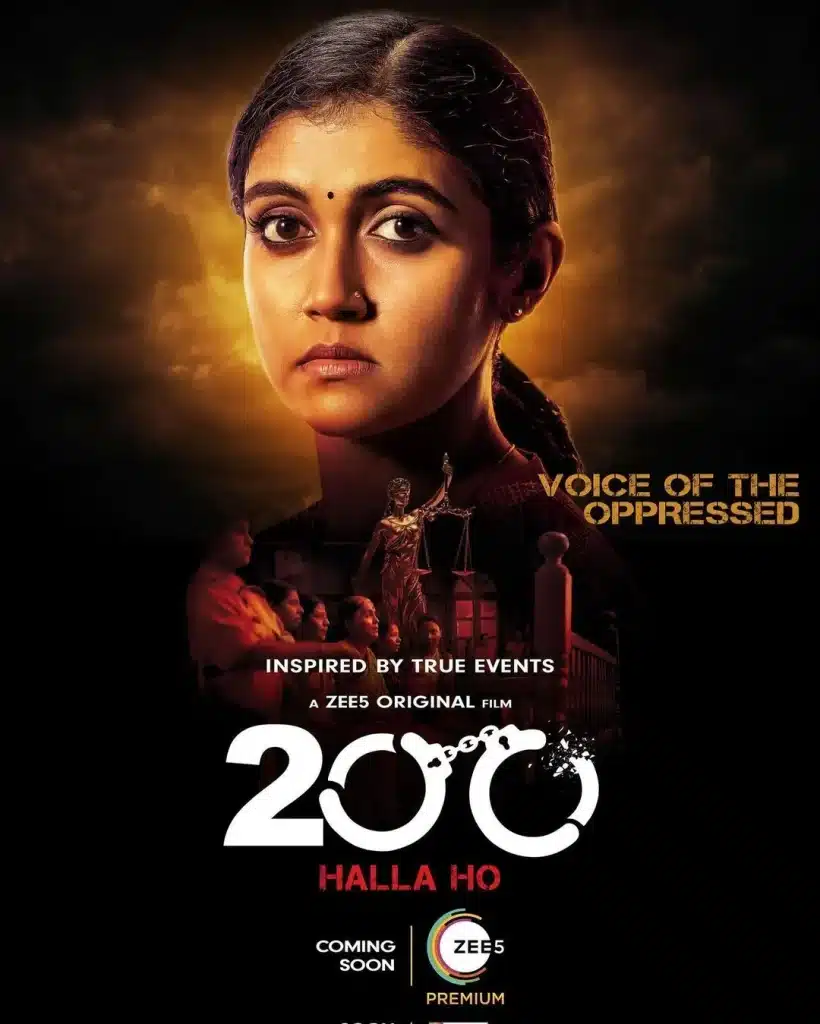
CAST: AMOL PALEKAR, RINKU RAJGURU, BARUN SOBTI, FLORA SAINI, SAHIL KHATTAR
DIRECTED BY: SARTHAK DASGUPTA
BLOOD AND GORE TRIGGER WARNING. Scenes of blood, killing, and body parts.
BLUF:
A mob of veiled, low-caste Dalit women enter a courthouse and brutally dismember an apprehended alleged rapist, who is under trial. A respected judge of the same community is asked to head an inquiry commission but he ends up defending the women arrested for this crime.
This is the story of the class divide and how politicians use the caste system for political gains.
THE MEAT AND THE POTATOES
The movie is loosely based on a real incident, of women, terrorized by a mobster whose gang-raped, robbed, intimidated, and murdered 300 families for 15 years until he met his nemesis in a young Dalit girl. This ZEE5 Original film narrates the powerful tale of 200 women who jolt the nation out of its indifference towards years of caste oppression and injustice. Set in the context of atrocities against women, the film captures an incident where 200 women took law and justice into their own hands and lynched a gangster, robber, serial killer, serial rapist, in open court.
Asha Surve, who works in the hospitality sector, comes back to her native community after a gap of many years to find out that while she has been away, the women and girls of her community have been raped and molested by a local mobster.
She files a police complaint against him, but the rapist seems to have the support of the local officers and a political backing.
This infuriates the people of the Dalit community. The day on which the rapist is to be produced in front of the Judge by the police, they throw chili powder in the air and dismember him to death.
The cops fabricate evidence and plant eyewitnesses to prove that five handpicked women of the Dalit community were responsible for the crime.
The twist in the story comes when a celebrated Justice, who belongs to the same community decides to fight for the rights of these women after learning about the back-story.
FWAR/IN THE KNOW
Unless there is a change in the attitude of the storytellers and moviemakers to bring the nuances of the Indian Caste system and its brutality to light, there will be less or no change in the way people are treated.
As the girl who is educating herself in the movie says, “People are the same at the cellular level.”
Then why has this system of class differentiation survived this long?
It is most refreshing to see Amol Palekar on screen after a long gap (2015 was when he was last on-screen). How we have missed his nuanced acting and presence.
He brings gravitas to the character of a retired Dalit High Court judge with his understated acting prowess.
Rinku Rajguru is well cast as the educated Dalit girl, Asha Surve who has a sense of human rights. Barun Sobti, though on-screen briefly has an impactful screen presence as a modern lawyer who has the guts to stand for what is right and does not believe in class-based privilege.
Sahil Khattar as the antagonist is brilliant. He brings a lot of credibility to the character through his body language. You despise him appropriately.
The most chilling scene is when the Fact-Finding Committee (FFC) lead, Judge Hadinge realizes that the cops were trying to hide the victims’ blood reports in the process of presenting the case to the court. The Judge says nonchalantly in the spirit of the law that any evidence can only be presented if it exists. If it doesn’t – it is my word against yours. It is not that the FFC did not want to get to the bottom of the case, it is just that the Judge was used to promulgating on basis of evidence and spirit of the law and he did not care what the truth was because he only looked at things that could be proven in the spirit of the law.
When Asha Surve points out to him “Knowing the constitution and law is not enough, being able to live it in the spirit of what it was written for is”, the Judge rethinks his philosophy.
The cops, edged by politicians, fast track the case without waiting for the report of the FFC to convict the women on basis of false eyewitnesses.
The irony of a country whose Constitution was written by B R Ambedkar, a Dalit himself. He had famously told Gandhi, “I have no homeland.”
The film direction, screenplay, and execution are nuanced. The background score, music, lighting, the cinematography is excellent.
Nothing in the movie is out of place and the narrative sticks to the investigation of the case as much as possible with a short subplot of the old romance between Rajguru and Sobti or the political aspirations of a woman politician played by Saini.
Overall, well done Dasgupta.
Will these open conversations up about the caste system or will we be asked to sweep the moot under the carpet as usual?
WHAT WE LOVED
Amol Palekar, more of him please
Direction, screenplay
Sahil Khattar
WHAT WE MISSED
Less of bloody gore maybe.




